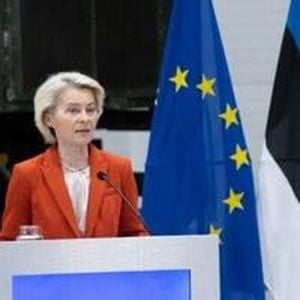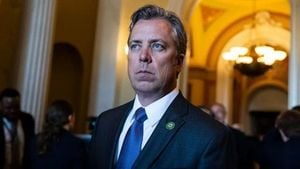OTTAWA — The Canadian Armed Forces (CAF) is on the upswing when it come to recruitment, as it aims to bolster its ranks amid rising concerns over security and personnel shortages. From the start of 2025, the CAF has seen approximately 1,000 more applications than the previous year, but officials, including Cmdr. Pascal Belhumeur, head of the military’s personnel generation group, caution against attributing this increase to any singular political event or figure, such as U.S. President Donald Trump and his controversial remarks about Canada.
Belhumeur stated, "We had about 1,000 more applicants than we did this time last year, but it’s not attributable to any specific incident... we won’t have data to explain the spike for some time." Nevertheless, there is mounting optimism within the CAF as more Canadians express interest in serving, aligning with the military’s goal of enlisting 6,496 members this fiscal year.
General Jennie Carignan, chief of defence staff, emphasized her commitment to recruitment, referring to it as her number one priority. After several tough years where outflows outpaced inflows, the military has turned the tide, noting net recruitment growth for the first time—albeit still significantly short of its targeted strength of 71,500 regular forces members and 30,000 reserves by April 2029.
This positive trend is particularly significant considering the historical backdrop; the past few years were described by Defence Minister Bill Blair as experiencing "a death spiral" due to the exodus of military personnel. Carignan reported, "We’ve had a net gain of 1,300 members this year," yet noted the CAF still falls short by over 13,600 troops.
One notable change implemented by the CAF was the policy allowing permanent residents to join the military—a shift introduced last December. This reform prompted meaningful interest: over 21,000 applications from this demographic were recorded within the first year. Of those, nearly half completed the application process, though only 455 recruits donned uniforms, with 357 of them enlisted within the past three months.
Belhumeur outlined the CAF’s collaboration with Immigration, Refugees and Citizenship Canada to expedite background checks for new recruits, helping streamline the onboarding process. This will facilitate smoother transitions for permanent residents who seek to contribute to Canada’s defense.
Maj.-Gen. Scott Malcolm, the military’s surgeon general, elaborated on adjustments concerning medical evaluations, stating, "We’re able to accept folks with a whole host of different conditions," moving away from blanket bans on applicants with medical histories such as asthma or anxiety. Recruits now have the opportunity to prove they are "fit to the task" during assessments, reflecting the CAF's adaptive approach.
To speed training, new recruits can begin their military training under a probationary status prior to completing full security clearance checks. This change intends to maintain efficiency during the increasingly competitive and urgent recruitment environment the CAF is currently addressing.
Old recruitment methods, such as the aptitude test, have been revamped. The previous Canadian Forces Aptitude Test has been replaced with the Scored Employment Application Form (SEAF), which takes broader aspects of candidates' lives and experiences, including education and life achievements, making for fairer assessments.
The modernization efforts are largely positioned as necessary reforms rather than compromises on standards of suitability. "Our number one priority is growing the Canadian Armed Forces to the desired end strength outlined by Government of Canada policy. By focusing on recruitment and retention, we will maintain our status as an employer of choice," noted Lt-Gen. Lise Bourgon, chief of military personnel.
Yet, amid this recruitment renaissance, external pressures loom large. Since President Trump took office, he has repeatedly criticized Canada for its military spending and threatened trade repercussions if defense budgets do not align with NATO expectations, particularly the goal of 2% of GDP by 2032. Trump suggests Canada should increase military investments and remarked, "Canada thinks we’re gonna protect them with our military, which is unfair," sparking significant discussions within Canadian political circles.
This fiscal focus has been highlighted by Prime Minister Justin Trudeau, who reaffirmed Canada's commitment to NATO spending targets during last summer's discussions. More recently, Defence Minister Blair considered accelerating these goals to 2027, though specifics on how remain elusive.
Military officials, including Carignan, see this discourse as supportive of their recruitment aims. She stated, "My job is to make sure I convert those investments to actual military capabilities," underlining the notion of recruitment as not just filling ranks but building functional and effective military operations.
The CAF's plans, if successful, will see significant changes not only to personnel numbers but also to the military's effectiveness. The adoption of modernized recruitment practices marks the military's commitment to equipping itself for the security needs of the present and future, all amid the backdrop of changing international relations and domestic expectations for military readiness.
This report from The Canadian Press was first published on February 19, 2025.



